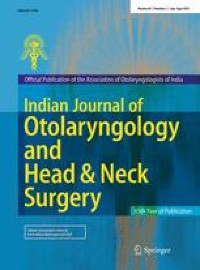Abstract
This study focused on outcomes of endoscopic posterior nasal neurectomy and turbinate reduction with regard to the common symptoms of allergic and vasomotor rhinitis. This randomized experimental study conducted between December 2018 to November 2020 included 60 patients, aged 18–50 years with allergic or vasomotor rhinitis with/ without deviated nasal septum of grade 3 and 4, not responding to conservative management. Patients were divided into two groups. 30 patients were operated for Posterior nasal nerve resection and 30 patients underwent turbinate reduction. SNOT 22 (Sino-nasal outcome test) questionnaire was given to every patient and they were asked four major symptoms of nasal obstruction, rhinorrhoea, sneezing and post nasal discharge and were told to rate their symptom in 1 to 5 severity scale before surgery and in postoperative follow up. Mean ± SD(standard deviation) of percentage change in SNOT 22 score in Posterior Nasal Nerve resection was 88.0 9 ± 4.38 which was significantly higher than turbinate reduction (82.95 ± 5.33) (p value = 0.0001). Distribution of post-operative complications was comparable in turbinate reduction and Posterior Nasal Nerve resection (Both synechia and crusting:10 versus 6.67% respectively) (p value = 1). No patient had bleeding in both groups. Though skill demand is high, posterior nasal neurectomy is highly safe and effective, as there was no bleeding post-operatively in spite of handling the sphenopalatine artery. Symptom relief with this surgery was 88.09% which was significantly higher as compared to submucosal resection of inferior turbinate with microdebrider (82.95%)



No comments:
Post a Comment